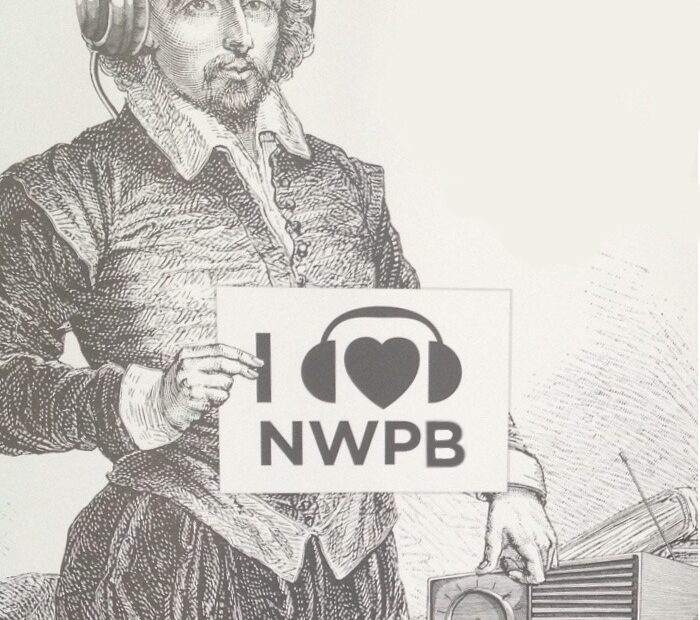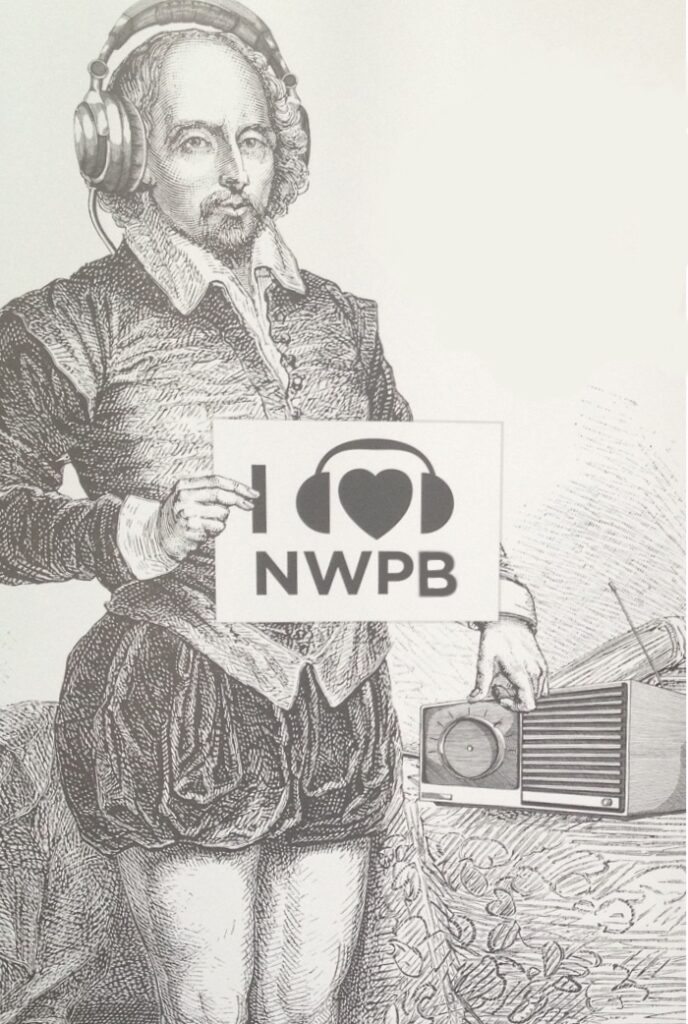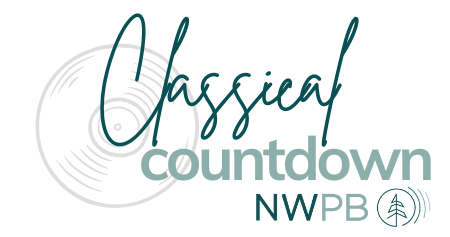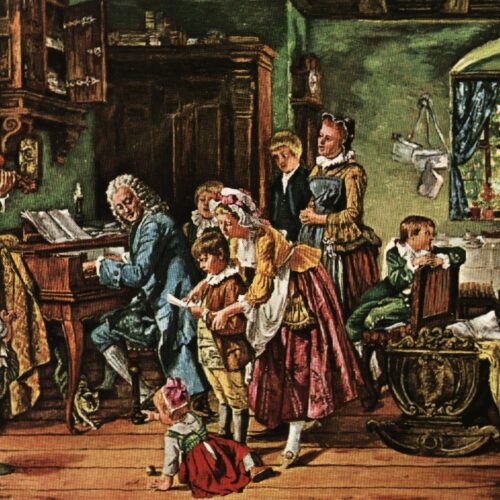
NWPB’s Shakespearean Favorites

William Shakespeare – author of deeply romantic prose, particularly memorable and witty dialogue, 27 plays and 375 poems. He also stood as inspiration for many an opera, overture and incidental music. There’s a lot to love about ‘The Bard,’ and NWPB rose to the task of picking some favorites in honor of his birthday – April 23.
Sueann Ramella
“When I was 8, living in base housing at McChord AFB…I memorized this quote. I don’t remember how I came upon it, or why I memorized it. But I do remember standing on my couch with a blanket cape and reciting it with passion and conviction to no audience…just me on my stage trying to feel the meaning of the words.”
Favorite Shakespearean Quote: “All the world’s a stage, and all the men and women merely players. They have their exits and their entrances; And one man in his time plays many parts.”-Jaques, As You Like It
Steve Reeder
Favorite Shakespearean Music: No question in my mind. Has to be “Romeo and Juliet” by Sergei Prokofiev. The greatest of all ballet scores. Brilliantly orchestrated and psychologically complex. It captures the irreverence of the young lovers, as well as the tragic absurdity of their fate. Yet Prokofiev and his collaborators initially had in mind a happy ending. True. As the composer dryly suggested at the time: “The living can dance. The dead cannot.”
Favorite Shakespearean Quote: “The man that hath no music in himself, Nor is not moved with concord of sweet sounds, Is fit for treasons, stratagems, and spoils; The motions of his spirit are dull as night, and his affections dark as Erebus. Let no such man be trusted. Mark the music.”-Lorenzo, The Merchant of Venice
Hannah Whisenant
Favorite Shakespearean Music: I really like the Nino Rota Taming Of The Shrew score (1967). That’s probably my favorite Shakespeare music. It’s just a movie with a soundtrack. Of that soundtrack, I love the theme called Student’s Masquerade (Ballad of Love). Very bouncy.
Favorite Shakespearean Quote:
“I see a woman may be made a fool
If she had not a spirit to resist.”-Katherine, Taming of the Shrew
Jessie Jacobs
Favorite Shakespearean Music: “Going to be totally original here and choose the Overture to Mendelssohn’s Midsummer Night’s Dream – it’s just such a classic and there’s a good reason for it! How can you not be absolutely enchanted by the fairies he creates out of the strings? And the braying donkey? Perfection. It has the same lighthearted, tender, silly feeling as the play, completely captured by a seventeen-year-old Mendelssohn, no less!
Favorite Shakespeare Quote: “A dear happiness to women: they would else have been troubled with a pernicious suitor. I thank God and my cold blood, I am of your humor for that: I had rather hear my dog bark at a crow than a man swear he loves me.” -Beatrice, Much Ado About Nothing
Thom Kokenge
“I say this in my head a lot when I read how humans sometimes behave.”
Favorite Shakespearean Quote:
“Lord, what fools these mortals be.” – Puck, A Midsummer Night’s Dream
Gigi Yellen
Favorite Shakespearean Music: “It was a lover and his lass,” from As You Like It, for solo singer with lute, set by Shakespeare’s contemporary Thomas Morley. Apparently there’s no evidence that this was ever used in a performance during their lifetimes, but it sure has survived into the hearts of Renaissance music lovers ever since. Intriguing comparison: Ralph Vaughan Williams set the same song, with a very different, melancholy flavor, for 2 male voices and piano.
Favorite Shakespearean Quote: Long before cameras and exit polls, Shakespeare (man of the theatre, tracker of audience reactions) revealed the power of capturing truth from a candid, off-guard expression. “The play’s the thing/ Wherein I’ll catch the conscience of the king.”- Hamlet
Sandi Billings
“I love it for its eloquent language and its use as a melancholy statement about parting.”
Favorite Shakespearean Quote:
“… Look, love, what envious streaks do lace the severing clouds in yonder east. / Night’s candles are burnt out and jocund day / stands tip-top on the misty mountain tops. / I must be gone and live, or stay and die.” – Romeo, Romeo & Juliet
Anjuli Dodhia
Favorite Shakespearean Music:
My pick is from one of the masters of translating Shakespeare’s plays to opera, Giuseppe Verdi. After all, of the over 200 operatic adaptations only a half-dozen or so are still regularly performed, and Verdi wrote three of them. The last of those was Falstaff, on an Italian libretto combining The Merry Wives of Windsor and Henry IV, Parts 1 & 2. It was his last opera and, in a departure from his regular style, a comedy. Particular highlights include the Act 1 finale, in which everyone is plotting and scheming against Sir John Falstaff in a fabulous nonet, and the Act 3 finale, when Falstaff leads the ensemble in declaring, “All the world’s a jest, man is born a joker, and he who laughs last laughs best.”
Favorite Shakespearean Quote:
“There are more things in heaven and earth, Horatio, / Than are dreamt of in your philosophy.” – Hamlet
Related Stories:

Dedicate Classical Music To A Special Someone This Valentine’s Day
Music can express and inspire so many emotions. That makes it a perfect way–a “heartfelt” way–for you to show your love and appreciation to someone who plays an important role in your life.

Vote For Your Favorite Music In NWPB’s Classical Countdown
What is your favorite symphonic movie score? Your favorite aria or overture? Whether it’s a well-known composition by Bach or Beethoven, or a hidden gem by a lesser-known composer, NWPB wants to know what pieces resonate with you.

Women’s History Music Moment: Bach’s Daughters
You’ve heard so much about the sons of Johann Sebastian Bach, but there were daughters, too.
Bach was 23, and his wife Maria Barbara was 24, when the first of their children was born. They named her Catherina Dorothea. CD grew into a singer, and helped out in her father’s music work. Fifteen years passed, her mother died, her father remarried, and finally, CD Bach acquired a sister: Cristina Sophia Henrietta, daughter of Johann Sebastian and Anna Magdalena Bach. CSH died at the age of three, just as another sister, Elizabeth Juliana Frederica, was born. EJF Bach would grow up to marry one of her father’s students.















